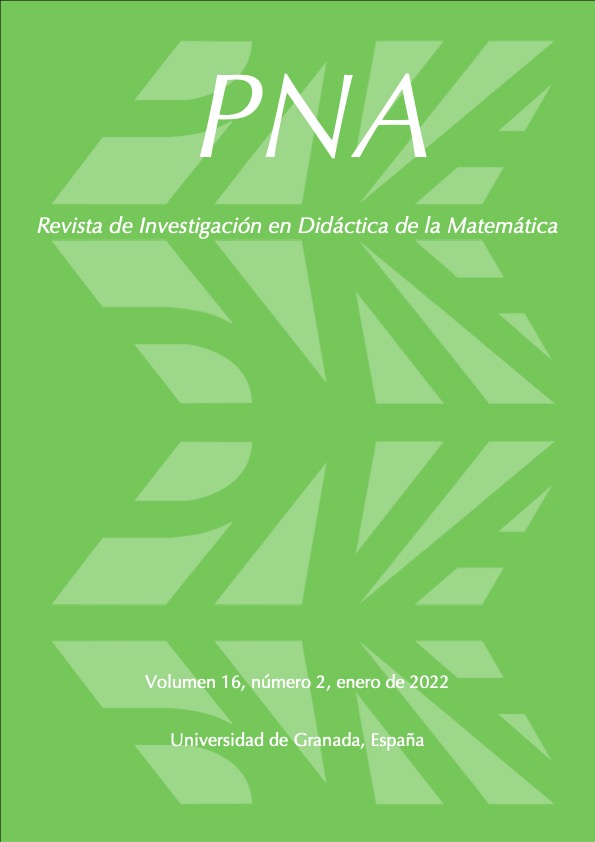Potential of the Techno-Pedagogical Tasks Model to Promote Conjecture Processes in University Students
DOI:
https://doi.org/10.30827/pna.v16i2.21334Keywords:
Conjecture processes, Discernment, Task Design, Techno-Pedagogical Tasks, Tesselation, Variation TheoryAbstract
In this article we examine the influence of geometry tasks on the development of conjecturing processes, aimed at first-semester architecture students. The design of the tasks was based on the Techno-Pedagogical Task Model (TTM). Following the guidelines of a design research, we used as an analytical tool the set of phases of the conjecturing process proposed by Cañadas et al. (2008), articulated with the patterns of variation suggested by Marton, Runesson and Tsui (2004). We conclude that the TTM offers a useful alternative to structure the design of tasks mediated by a dynamic geometry software, the purpose of which is to promote conjecturing processes.
Downloads
References
Alfonso-Cuellar, J. J., Mancera-Vaetts, L. P. y Cárdenas, Y. (2018). Trabajo colaborativo mediado por las TIC: estrategia para el fomento de la competencia argumentativa. Revista Virtual Universidad Católica del Norte, 1(54), 41-55.
Arzarello, F., Andriano, V., Olivero, F. y Robutti, O. (1998). Abduction and conjecturing in mathematics. Philosophica, 1(61), 77-94.
Baccaglini-Frank, A. (2019). Dragging, instrumented abduction and evidence, in processes of conjecture generation in a dynamic geometry enviroment. ZDM, 51(5), 779-791. https://doi.org/10.1007/s11858-019-01046-8
Bell, A. W. (1976) A study of pupil’s proof-explanations in mathematical situations. Educational Studies in Mathematics, 7(1), 23-40.
Boero, P., Fenaroli, G. y Guala, E. (2018). Mathematical argumentation in elementary teacher education: The key role of the cultural analysis of the content. En A. Stylianides y G. Harel (Eds.), Advances in mathematics education research on proof and proving: An international perspective (pp. 49-67). Springer. https://doi.org/10.1007/978-3-319-70996-3_4
Bravo-Castillo, M., y Mejía-Giraldo, A. (2010). Los retos de la Educación Superior en Colombia: una reflexión sobre el fenómeno de la deserción universitaria. Revista Educación en Ingeniería, 5(10), 85-98. http://dx.doi.org/10.26507/rei.v5n10.101
Camargo, L. (2021). Estrategias cualitativas de investigación en educación matemática. Recursos para la captura de información y el análisis. Fondo Editorial Universidad de Antioquia.
Cañadas, M. C., Deulofeu-Piquet, J., Figueiras, L., Reid, D. A. y Yevdokimov, O. (2008). Perspectivas teóricas en el proceso de elaboración de conjeturas e implicaciones para la práctica: tipos y pasos. Revista Enseñanza de las Ciencias, 26(3), 431-441.
Fahlgren, M., y Brunström, M. (2014). A model for task design with focus on exploration, explanation, and generalization in a dynamic geometry environment. Technology, Knowledge and Learning, 19(3), 287-315. http://dx.doi.org/10.1007/s10758-014-9213-9
Garcia-Barrera, A. (2015). Importancia de la competencia argumentativa en el ámbito educativo: una propuesta para su enseñanza a través del role playing online. RED-Revista de Educación a Distancia, 1(45), 1-20.
http://dx.doi.org/10.6018/red/45/alba
Hohenwarter, M. (2002). GeoGebra (Versión 5.0) [Software de ordenador o App para móvil]. https://www.geogebra.org
Kieran, C., Doorman, M. y Ohtani, M. (2015). Frameworks and principles for task design. En A. Watson y M. Ohtani (Eds.), Task design in mathematics education, an ICMI study 22 (pp. 19-81). Springer. https://doi.org/10.1007/978-3-319-09629-2_2
Kovacs, Z., Recio, T. y Vélez, M. P. (2018). Using automated reasoning tools in GeoGebra in the teaching and learning of proving in geometry. International Journal of Technology in Mathematics Education, 25(2), 33-50. http://dx.doi.org/10.1564/tme_v25.2.03
Leung, A. (2011). An epistemic model of task design in dynamic geometry environment. ZDM, 43(3), 325-336. http://dx.doi.org/10.1007/s11858-011-0329-2
Lo, M. L. (2012). Variation theory and the improvement of teaching and learning. Göteborgs Universitet.
Lynch, A. G. y Lockwood, E. (2019). A comparison between mathematicians’ and students’ use of examples for conjecturing and proving. The Journal of Mathematical Behavior, 53, 323-338. https://doi.org/10.1016/j.jmathb.2017.07.004
Marrades, R. y Gutiérrez, A. (2000). Proofs produced by secondary school students learning geometry in a dynamic computer environment. Educational Studies in Mathematics, 44(1), 87-125. https://doi.org/10.1023/A:1012785106627
Marton, F., y Booth, S. (1997). Learning and awareness. Lawrence Erlbaum Associates.
Marton, F., Runesson, U. y Tsui, A. B. M. (2004). The space of learning. En F. Marton y A. B. M. Tsui (Eds.), Classroom discourse and the space of learning (pp. 3-40). Lawrence Erlbaum Associates. http://dx.doi.org/10.4324/9781410609762
Molina, M., Castro, E., Molina, J. L. y Castro, E. (2011). Un acercamiento a la investigación de diseño a través de los experimentos de enseñanza. Enseñanza de las Ciencias, 29(1), 75-88.
Rabardel, P. (1995). Les hommes et les technologies - Approche cognitive des instruments contemporains. Armand Colin.
Romero, L. (2018). Tareas tecno-pedagógicas: un modelo para promover la conjeturación en la educación superior [Tesis de maestría, Universidad Pedagógica Nacional]. Repositorio Institucional-Universidad Pedagógica Nacional.
Santos-Trigo, M. y Espinosa-Pérez, H. (2002). Searching and exploring properties of geometric configurations using dynamic software. International Journal of Mathematical Education in Science and Technology, 33(1), 37-50. http://dx.doi.org/10.1080/00207390110087129
Stylianides, A. J. y Ball, D. L. (2008). Understanding and describing mathematical knowledge for teaching: Knowledge about proof for engaging students in the activity of proving. Journal of Mathematics Teacher Education, 11(4), 307-332. https://doi.org/10.1007/s10857-008-9077-9
Toro, J. R. y Villaveces, J. L. (2008). El pensamiento matemático: una competencia emergente. Ministerio de Educación Nacional de la Republica de Colombia. https://www.mineducacion.gov.co/1759/articles 189357_archivo_pdf_matematica_1B.pdf
Weinberger, A., Fischer, F., y Stegmann, K. (2005). Computer-supported collaborative learning in higher education: Scripts for argumentative knowledge construction in distributed groups. En T. Koschman, D. D. Suthers y T-K. Chan (Eds.) Proceedings of the International Conference on Computer Support for Collaborative Learning: The Next 10 Years! (pp. 717-726). International Society of the Learning Sciences. https://doi.dx.org/10.22318/cscl2005.717



















